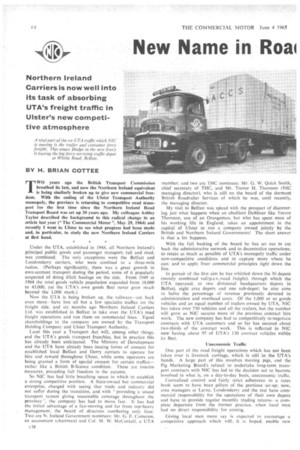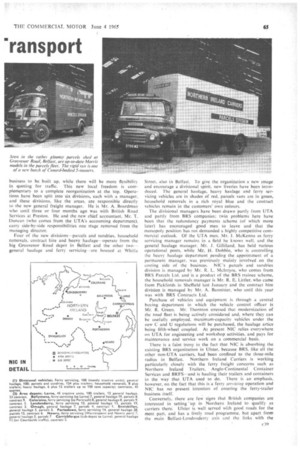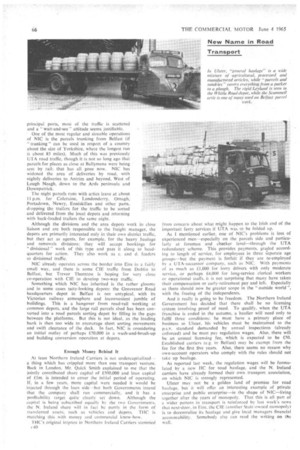Northern Ireland Carriers is now well into its task of absorbing UTA's freight traffic in Ulster's new competitive atmosphere
Page 66

Page 67

Page 68

If you've noticed an error in this article please click here to report it so we can fix it.
A vital part of the ex-UTA traffic which N1C is moving is the trailer and container Jerry freight, This smart Dodge in the new livery is leaving the big ferry-servicing traffic depot at Whiffet Road, Belfast.
BY H. BRIAN COTTEE
TWO years ago the British Transport Commission breathed its last, and now the Northern Ireland equivalent is being similarly broken up to give new commercial freedom. With the ending of the Ulster Transport Authority monopoly, the province is returning to competitive road transport for the first time since the Northern Ireland Road Transport Board was set up 30 years ago. My colleague Ashley Taylor described the background to this radical change in an article last year (" The Commercial Motor ", May 29, 1964) and recently I went to Ulster to see what progress had been made and, in particular, to study the new Northern Ireland Carriers at first hand.
* I *
Under the UTA, established in 1948, all Northern Ireland's principal public goods and passenger transport, rail and road, was combined. The only exceptions were the Belfast and Londonderry carriers, who were confined to a three-mile radius. (Perhaps significantly, there was a great growth in own-account transport during the period, some of it popularly suspected of doing illicit haulage on the side. From 1949 to 1964 the total goods vehicle population expanded from 18,000 to 43,000, yet the UTA's own goods fleet never grew much beyond the 1,000 mark.)
Now the UTA is being broken up, the railways—cut back even more—have lost all but a few specialist traffics on the freight side, and six months ago Northern Ireland Carriers Ltd. was established in Belfast to take over the UTA's road freight operations and run them on commercial lines. Equal shareholdings in the company are owned by the Transport Holding Company and Ulster Transport Authority.
Later this year a Transport Act will, among other things, end the UTA's goods transport franchise, but in practice this has already been anticipated. The Ministry of Development and the UTA have already been issuing forms of consent for established local Belfast and Derry carriers to operate for hire and reward throughout Ulster, while some operators are being granted a form of special consent for certain traffics— rather like a British B-licence condition. These are interim measures, preceding full freedom in the autumn.
So NIC has had little breathing space in which to establish a strong competitive positionA State-owned but commercial enterprise, charged with seeing that trade and industry did not suffer during the transition, and with "providing a sound transport system giving reasonable coverage throughout the province ", the company has had to move fast. It has had the initial advantage of a fast-moving and far from top-heavy management. the board of directors numbering only four. Two are N. Ireland Government nominees: Mr. G. E. Cameron, an accountant (chairman) and Col. M. W. McCorkell. a UTA member; and two are THC nominees: Mr. G. W. Quick Smith, chief secretary of THC, and Mr. Trevor H. Thornton (NIC managing director), who is still on the board of the dormant British Roadrailer Services of which he was, until recently, the managing director.
My visit to Belfast was spiced with the prospect of discovering just what happens when an ebullient Dubliner like Trevor Thornton, son of an Orangeman, but who has spent most of his working life in England, takes an appointment in the capital of Ulster to run a company owned jointly by the British and Northern Ireland Governments! The short answer is that a lot happens.
With the full backing of the board he has set out to cut back the administrative network and to decentralize operations; to retain as much as possible of UTA's monopoly traffic under now-competitive conditions and to capture more where he can; and to apply freer commercial principles right down the In pursuit of the first aim he has whittled down the 30 depots (mostly combined rail/p.s.v./road freight), through which the UTA operated, to two divisional headquarters 'depots in Belfast, eight area depots and one sub-depot; he also aims to halve the percentage of revenue previously devoted to administration and overhead costs. Of the 1,000 or so goods vehicles and an equal number of trailers owned by UTA, NIC has taken over 730 vehicles and all the trailers, but the number will grow as NIC secures more of the previous contract hire work. The new company has had to competitively re-negotiate contracts with UTA customers and so far has secured about two-thirds of the contract work. This is reflected in NEC now having about 95 of UTA's 130 contract vehicles within its fleet.
Uneconomic Traffic
One part of the road freight operations which has net been taken over is livestock carriage, which is still 'in the UTA's hands, A large part of this involves moving pigs, and the Pig Marketing Board's refusal to undertake long-term transport contracts with NIC has led to the decision not to becorne involved in what is, on a day-to-day basis, uneconomic traffic.
Centralised control and fairly strict adherence to a rates book seem to have been pillars of the previous set-up; now, area managers at Larne, Londonderry and the rest have commercial responsibility for the operations of their own depots and have to provide regular monthly trading returns—a complete departure from the former practice, when local men had no direct responsibility for costing.
Giving local men more say is expected to encourage -a competitive approach which will, it is hoped, enable new business to be. built up. while there will be more flexibility in quoting for traffic. This new local freedom is complementary to a complete reorganization at the top. Operations have been split into six divisions, each with a manager, and these divisions, like the areas, are responsible directly to the new general freight manager. He is Mr. A. Boardman who until three or four months ago was with British Road Services at Preston. He and the new chief accountant, Mr. T. Duncan (who comes from the UTA's accounting department), carry side-by-side responsibilities one stage removed from the managing director.
Four of the new divisions—parcels and sundries, household removals, contract hire and heavy haulage—operate from the big Grosvenor Road depot in Belfast and the other two— general haulage and ferry servicing—are housed at Whitla Street, also in Belfast. To give the organization a new image and encourage a divisional spirit, new liveries have been introduced. The general haulage, heavy haulage and ferry servicing vehicles are in shades of red, parcels vans are in green, household removals in a rich rciyal blue and the contract vehicles remain in the customers' own colours.
The divisional managers have been drawn partly from UTA and partly from BRS companies; twin problems here have been that the redundancy payments scheme (of which more later) has encouraged good men to leave and that the monopoly position has not demanded a highly competitive commercial outlook. Of the UTA men, Mr. J. McKenna as ferry servicing manager remains in a field he knows well, and the general haulage manager, Mr. J. Gilliland, has held various operational posts, while Mr. H. Dobbin, who is controlling the heavy haulage department pending the appointment of a permanent manager, was previously mainly involved on the costing side of the business. NIC's parcels and sundries division is managed by Mr. R. L. McIntyre, who comes from BRS Parcels Ltd. and is a product of the BRS trainee scheme, the household removals manager is Mr. R. E. Littler, who came from Pickfords in Sheffield last January and the contract hire division is managed by Mr. A. Bannister, who until this year was with BRS Contracts Ltd.
Purchase of vehicles and equipment is through a central buying department in which the vehicle control officer is Mr. R. Green. Mr. Thornton stressed that modernization of the road fleet is being actively considered and, where they can be usefully employed, maximum-capacity vehicles under the new C and U regulations will be purchased, the haulage artic15 being fifth-wheel coupled. At present N1C relies everywhere on UTA for engineering and workshop activities, and pays for maintenance and service work on a commercial basis.
There is a faint irony in the fact that NIC is absorbing the existing BRS organization in Ulster, because BRS, like all the other non-UTA carriers, had been confined to the three-mile radius in Belfast. Northern Ireland Carriers is working particularly closely with the ferry freight concerns such as Northern Ireland Trailers, Anglo-Continental Container Services and BRFS—and is hauling their trailers and containers in the way that UTA used to do. There is an emphasis, however, on the fact that this is a ferry servicing operation and -MC has no present intention of entering the ferry-trailer business itself.
Conversely, there are few signs that British companies are interested in setting 'up in Northern Ireland to qualify as carriers there. Ulster is well served with good roads for the most part, and has a lively road programme, but apart from the main Belfast-Londonderry axis and the links with the principal ports, most of the traffic is scattered and a " wait-and-see" attitude seems justifiable.
• One of the most regular and sizeable operations of NIC is the parcels trunking from Belfast (if " trunking" can be used in respect of a country about the size of Yorkshire, where the longest run is about 85 miles). Much of this was previously UTA road traffic, though it is not so long ago that parcels for places as close at Ballymena were being sent by rail; that has all gone now. NEC has widened the area of deliveries by road, with nightly deliveries to Antrim and beyond. West of Lough Neagh, clown to the Ards peninsula and Downpatrick.
The night parcels runs with artics leave at about 11 p.m. for Coleraine, Londonderry, Omagh, Portadown, Newry, Enniskillen and other parts. dropping the trailers for the traffic to be sorted and delivered from the local depots and returning with back-loaded trailers the same night.
Although the divisions and the area depots work in close liaison and are both responsible to the freight manager, the depots are primarily interested only in their own district traffic, but they act as agents, for example, for the heavy ,haulage and removals divisions: they will accept bookings for " divisional " work of this type and pass it along to headquarters for action. They also work as c. and d. feeders to divisional traffic.
MC already operates across the border into Eire in a fairly small way. and there is some CIE traffic from Dublin to Belfast, but Trevor Thornton is hoping for very close co-operation with CIE to develop two-way traffic.
Something which NIC has inherited is the rather gloomy and in some cases tatty-looking depots: the Grosvenor Road headquarters depot in Belfast is not untypical, with its Victorian railway atmosphere and inconvenient jumble of buildings. This is a hangover from road-rail working at common depots, and the large rail parcels shed has been converted into a road parcels sorting depot by filling in the gaps between the platforms. But this is not ideal, as the loading bank is then too wide to encourage short sorting movements and swift clearance of the deck. In fact. NIC is considering an initial outlay of perhaps £50.000 in a wash-and-brush-up and building conversion operation at depots.
Enough Money Behind It At least Northern Ireland Carriers is not undercapitalized a thing which has crippled more than one transport venture. Back in London, Mr. Quick Smith explained to me that the jointly contributed share capital of £500,000 and loan capital of {lm. is intended to cover the initial period of operating. If, in a few years, More capital were needed it would be injected through the loan side---but both Governments intend that the company shall run commercially, and it has a
profitability target quite clearly .set down. Although the capital is being subscribed equally by the two Governments, the N. Ireland share will in fact be partly in the form of transferred assets. such as vehicles and depots. TI-IC is matching this with money and commercial know-how.
TFIC's original interest in Northern Ireland Carriers stemmed
from concerti about what might happen to the Irish end of the important ferry services if -UTA was to be folded up.
As I mentioned earlier, one of NIC's problems is loss of experienced men—especially on the parcels side and particularly at foreman and checker level--through the .UTA redundancy scheme. This provides payments, graded according to length of service, for employees in three separate age groups—but the payment is forfeit if they are re-employed by a UTA-successor company, such as MC With payments of as much as £1,000 for lorry drivers with only moderate service, or perhaps £4,000 for long-service clerical workers or operational staffs, it is not surprising that many have taken their compensation or early-retirement pay and left. Especially as there should now be greater scope in the "outside world with the freeing of the independents.
And it really is going to be freedom. The Northern Ireland Government has decided that there shall be no licensing system involving proof of need. To qualify, when the UTA franchise is ended in the autumn, a haulier will need only to fulfil three conditions: he must have a primary place of business in Ulster, his vehicles must be maintained to the p.s.v. standard demanded by annual inspections (already enforced) and he must pay regulation wages. Also, there will be an annual licensing fee, which is expected to be £50. Established carriers (e.g. in Belfast) may be exempt from the fee for the first. five years. Also, there seems no reason why own-account operators who comply with the rules should not take up haulage.
As reported last week, the regulation wages will be formulated by a new JIC for road haulage, and the N. Ireland carriers have already formed their own transport association, on which NIC is strongly represented.
Ulster may not be a golden land of promise for road haulage, but it will offer an interesting example of private enterprise and public enterprise—in the shape of NIC—living together after the years of monopoly. That this is all part of a wider pattern in transport is reinforced by last week's news that next-door. in Eire. the CIE (another State-owned monopoly) is to decentralize its haulage and give local managers financial accountability. Somebody else can read the writing on the wall.
























































































































